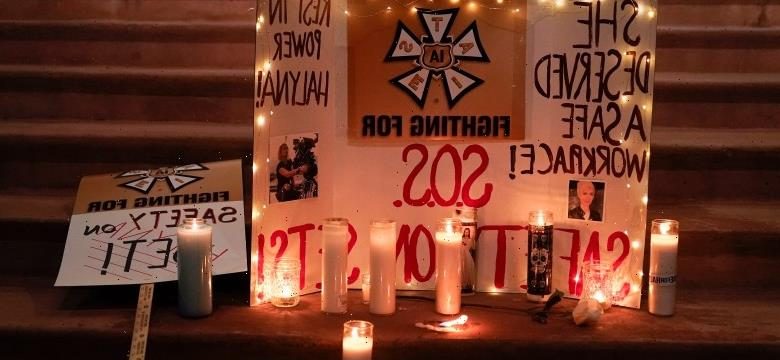The shooting death of Halyna Hutchins on the set of “Rust” could create a Hollywood where gun violence becomes imaginary. Already, some showrunners pledge to use simulated gunfire while a California Senate leader said he plans to introduce a bill to severely restrict the use of real weapons in movies.
On October 21, what police described as a “live round” struck “Rust” cinematographer Hutchins and the film’s director, Joel Souza, after Baldwin fired a prop gun during rehearsal. Moments before, crew announced to the set that it was a “cold” gun, meaning it did not contain live rounds.
Shortly after the tragic news broke, American Film Institute graduate Bandar Albuliwi posted a petition on Change.org demanding that Baldwin “use his power and influence” in the industry to make change and ban real guns on set. As of the morning of October 26, the petition now has nearly 40,000 signatures.
Albuliwi graduated from AFI five years before Hutchins and described the conservatory’s alum as lifelong family.
“I spontaneously, impulsively, went to Change.org and improv’d that petition,” he told IndieWire. “Everything I was feeling at that moment, I decided to put down on the page.”
In the days since Hutchins’ death, reporting from multiple outlets and the Santa Fe Sherrif Office’s search warrants suggest that “Rust” was a deeply troubled production with misfiring weapons, delayed payment to crew, and a walkoff by the camera team in response to unsafe working conditions.
Discussions of crew safety are a cornerstone of the labor movement borne out of current contract talks between IATSE and the AMPTP. The two sides reached a tentative deal October 16, but it requires approval by IATSE membership in an upcoming voting period. IATSE has not announced a date for the ratification vote.
“This is just the tip of the iceberg,” Albuliwi said. “Really, the entire issue that led up to this was the crews’ working conditions.”
Just one day after Hutchins’ death, Alexi Hawley, showrunner of the ABC police drama “The Rookie,” led an effort to get live weapons banned from his set, effective. While the series primarily used CGI to portray muzzle flashes, it occasionally used live guns; now, all on-set. gunfire will be Air Soft guns with muzzle flashes added in post-production, according to the Hollywood Reporter.
That same day, “The Boys” showrunner Eric Kripke tweeted that there would be “no more guns with blanks on any of my sets ever.”
Blanks are cartridges that, when fired, generate both the burst of light at the end of the gun (a muzzle flash) and a booming sound, without shooting a projectile. Even these can be lethal: In 1993, Brandon Lee died after another actor on the set of “The Crow” fired a gun containing a blank round. No one cleared the gun barrel, which still contained a bullet fragment. The blank’s explosion propelled it out of the gun, striking Lee.
Whether the “Rust” gun Baldwin fired contained a bullet or blank remains unclear. While police described it as containing a “live round,” that term is sometimes understood by those in the industry to include blanks. The incident remains under investigation by authorities in New Mexico.
Hutchins’ death comes nearly three decades after Lee’s. Today, the film community is pushing for the kind of gun control that failed to materialize in the wake of Lee’s death.
Speaking during a Sunday vigil in Burbank for Hutchins, American Society of Cinematographers President Stephen Lighthill called for the community to rally in favor of gun control.
“There is no place for weapons that can kill on a motion picture set. Rubber guns are totally acceptable now and can be made to look as real as they need to be,” he said.
California State Sen. Dave Cortese, a San Jose Democrat who chairs the Senate Labor Committee, said he will introduce a bill in the Legislature early next year that would ban live ammunition on sets, as well as firearms capable of shooting live ammunition.
“It is important that California establish new safety standards and best practices for all those who work in the industry and particularly in our own state,” he said, according to the Los Angeles Times. “Those working behind the scenes to entertain and bring joy to millions all over the world shouldn’t go to set worrying if they will return home safely to their family. Our entertainment industry must do a better job of ensuring safe working conditions for our hardworking crews.”
For now, Albuliwi urges his colleagues to continue the conversation, sign the petition, and consider more legislation that could protect film workers.
“We’re seeing changes already. This is what makes me so excited,” he said. “We haven’t even gotten to the stage where we’re going to force it down Washington’s throat to get it passed.”
The petition is available here.
Source: Read Full Article
